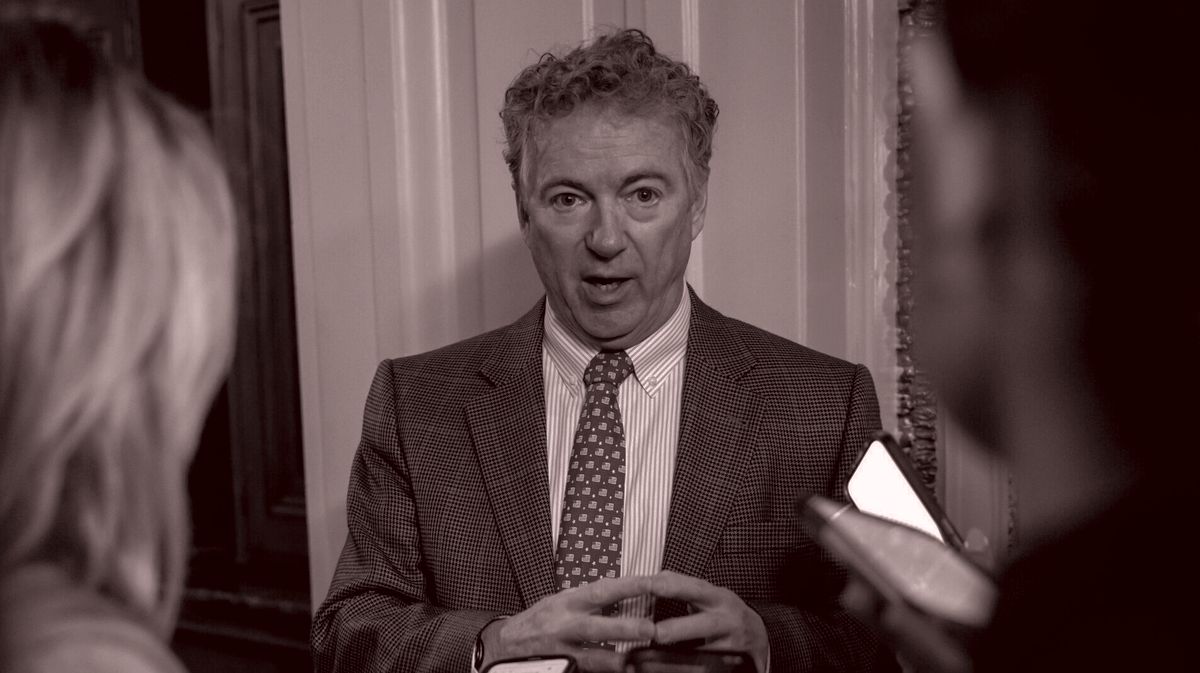Welcome back to The Best & The Brightest. I’m Leigh Ann
Caldwell, a bit bleary-eyed along with the rest of the Washington media world (and members of Congress) after last night’s stemwinder of a non–State of the Union speech. Before Trump took the mic, I joined NBC News’s Tom Llamas, who was just named as Lester Holt’s successor on Nightly News, and Hallie Jackson on set for their special coverage. I’m going to spare you the highlights and hot takes—I’m sure you’ve
had enough of those already—except to say that whatever you think of Trump, he is a master emcee.
In tonight’s issue, I explore another type of performative politics—Republicans’ contradictory relationship with the president. Privately, of course, many lawmakers are uneasy about the president’s trade wars with Canada and Mexico and China, and at least somewhat concerned
about the depth of Elon Musk’s cuts to government functions and services. Publicly, however, most are reciting the mantra that these are all just temporary dislocations on the eventual path to economic nirvana. Along the way, Republicans are also ceding their own powers to a president they can only hope is successful.
Still, there’s one Republican who has been remarkably consistent in
his critique that Congress has ceded far too much authority to the executive: Rand Paul. Our conversation about Washington’s crumbling division of power, below the fold.
|
|
|
A MESSAGE FROM OUR SPONSOR
|
Medicaid funding cuts
pose a threat to children, seniors, veterans, and people with disabilities.
|
|
|
- A funding fight prisoner swap: The White House is executing a full-court press to get Republicans behind a funding extension through the rest of the fiscal year ending September 30. Trump hosted the most conservative House members—the likeliest potential holdouts—at the White House today to get them in line. Previously, Office of Management and Budget Director Russell Vought and his likely deputy, former Rep. Dan Bishop, had made their own
attempt Monday night—they met with the fiscally hardline Freedom Caucus, and told them that they needed to keep the government’s lights on if they wanted Trump and Musk to keep gutting their least favorite programs. If some Republicans stuck to their “no” votes on the funding bill, Vought added, leadership would be forced to exchange concessions for Democratic votes, according to a person familiar.
Meanwhile, Democrats aren’t keen on a bill that extends funding through the rest of
the year, allowing Trump more power to direct spending however he likes. They want a shorter-term funding bill that buys time for writing individual spending bills and inserts more guardrails for Congress to direct how money should be spent. And Democratic and Republican appropriators are still working on this possible Plan B in case Trump’s rest-of-the-year funding bill can’t pass. Confused yet? Either way, if nothing passes, government funding runs out a week from Friday.
- Tactically sound: As I said, I won’t rehash Trump’s speech, but I can talk about how Democrats reacted to it. Those who attended—many of them didn’t—color-coded their threads in Barbie-affirming pink and held up little auction paddles, or mini white boards, with not-so-subliminal messages written on them (“Lies,” “Musk steals,” “False,” “Save Medicaid,” and the like). They’ve taken some flak for the tactics, organized by the Congressional
Progressive Caucus, which critics described as amateurish, petty, and ineffective.
But participating Democrats thought that doing something was better than doing nothing as Trump held court with millions tuning in. Plus, one progressive Democratic strategist argued that the substance of their message is popular, and one that all Democrats are behind. “The right question isn’t, ‘What do we think of any particular tactic?’” the strategist said. “It’s ‘Are we
using every single tactic we have to raise the salience of Medicaid, vets, and Musk?’ which are great issues for us.”
|
Now, a quick update on another D.C. institution, MSNBC, from my partner
Dylan Byers…
|
|
|

|
Dylan Byers
|
|
- Maddow as Hell,
cont’d: Rachel Maddow’s recent crusade against MSNBC’s front office appears to have been even more misguided than I’d initially appreciated. As you’ll recall, the primetime star put her new boss, Rebecca Kutler, on blast last week for canceling Joy Reid’s show and others hosted by people of
color—without noting that Reid was being replaced by three hosts of color, and that Kutler was also adding more diversity on the weekends. Maddow also took management to task on live television over the “indefensible” decision to fire production staff and ask them to reapply for new jobs—which, as I noted, showed Maddow’s lack of appreciation for both the shrinking media landscape as well as the effect her own $25 million annual salary had on those economics.
In Maddow’s
telling, the firing-and-rehiring practice was “not the right way to treat people, and it’s inefficient, and it’s unnecessary.” But, as I’ve since learned, the reason MSNBC conducts matters this way is due to the demands of the MSNBC union that Maddow herself has long championed. Historically, MSNBC would reassign production staff to other shows in the event of a cancellation. But when the union reached its first collective bargaining agreement, in December 2023, it demanded equal
treatment for all employees, which made it harder for the network to reassign certain staffers while laying off others.
In January 2024, MSNBC made programming changes that affected roughly 75 employees, all of whom were laid off and then invited to reapply for positions with the new shows. The vast majority of these staffers were rehired, while around 10 or so others either took jobs elsewhere or simply weren’t rehired. The same thing is likely to happen this time
around. As I noted last week, roughly 125 employees were laid off, and about 110 new positions are on offer. None of this is ideal, of course, but it’s pretty decent by the current standards of the industry.
|
|
|
The libertarian Kentucky senator Rand Paul is one of few Republicans
to openly oppose Trump on tariffs and separation of powers. Is anyone listening?
|
|
|
While the rest of the party had dutifully marched behind the president in
tariff-imposing, government-cutting solidarity, Rand Paul has been one of the few Republicans in the House or Senate to publicly criticize Trump. Paul, of course, is a contrarian by nature. He’s also a consistent free-market libertarian who insists that other members of the G.O.P. privately agree with him and “whisper under their breath [that] free trade is good.”
Yesterday, hours after Trump imposed new 25 percent tariffs on Canada and
Mexico and additional 10 percent levies on China, I got on the phone with Paul to discuss the policy and his views. At the time, his colleagues in the party were mostly keeping their nerves to themselves, and crossing their fingers and toes that tariffs could somehow benefit the economy in the long run, even as Trump himself admitted there will be some dislocation. North Dakota Senator John Hoeven told me he spoke with Secretary of Agriculture Brooke Rollins
about reviving a program used to bail out tariff-afflicted farmers during Trump’s first term, to the tune of $28 billion. “We have to hope” this is the right strategy, Hoeven said.
|
|
|
A MESSAGE FROM OUR SPONSOR
|
Medicaid funding cuts
pose a threat to children, seniors, veterans, and people with disabilities.
|
|
|
Paul’s not indulging such hopes: He thinks tariffs make for bad economics. He also
argued that these latest tolls are another attempt by the executive branch to steal power that the Constitution assigned to Congress. (Notably, however, the first law that Congress sent George Washington in 1789 was the Tariff Act, which attempted to raise revenue by placing a 5 percent tax on all imports.) A strict constitutionalist—and an annoyingly punctilious
one, to many of his colleagues—Paul doesn’t think this president should get a free pass on separation of powers from Republicans just because he represents their party.
Most of his colleagues, of course, are gladly handing over their authority to a president they’re afraid to cross. While Democrats insist that Elon Musk’s DOGE cuts encroach on Congress’s power of the purse, Speaker Mike Johnson has said that they’re actually the ones committing
a “gross separation of powers violation” by demanding to protect congressional appropriations. Senator Tim Scott declared on the floor this week that “now is not the time to tie the hands of President Trump.” Anyway, Paul is an outlier, who has consistently diverged from his party’s expansive view of executive power. (He has also long fought to wrest back Congress’s power to declare war, which presidents have pretty much consistently ignored since the last time Congress
exercised it in World War II.)
Paul suggested the president probably has the authority to pause government funding, but that Congress has to pass the cuts to make them legal and permanent. As someone who wants the smallest government possible, Paul supports the cuts themselves. And he asked Vice President J.D. Vance during a Senate Republican lunch a few weeks ago to send Congress a package listing all the administration’s cuts—a.k.a., a rescissions package—so
that Congress could codify them into law and ensure they aren’t refunded. Rand made the same request to Musk during a G.O.P. meeting today. The White House didn’t respond when I asked if they planned to do so.
To the extent other Republicans share Paul’s concerns, most aren’t willing to do anything about them just yet. “Most of us are aware that we
gave up a lot of our authority,” Senator Mike Rounds told me, “but I think that’ll be revisited in the future, as other items of a unitary presidency are discussed”—for instance, if the courts thoroughly stymie the president. But the reality, according to Paul, is: “This is sort of the problem in Washington. [Republicans are] often for something when it’s a Democrat president, [and] they’re against it when it’s a Republican president.”
|
“Our Founding Fathers Would Be Horrified”
|
Legally, Trump is justifying some of these latest tariffs under a 1962 and a
follow-up 1977 law that gives the president the authority to impose import taxes during a “national emergency.” (Paul also has legislation to sunset presidentially declared emergencies, and require a simple majority in Congress to vote to extend them; currently, there are nearly 40 such “national emergencies” ongoing.) But Trump’s policy justifications are manifold: fentanyl! Fairness! Jobs! Take your pick.
|
|
|
So Paul has introduced legislation, the No Taxation Without Representation Act,
that would require Congress to approve any tariff—even the ones already in place and justified by presidents under laws dating back to the Tariff Act of 1930. “I don’t know how we came to the point that Congress said, ‘Oh, well, we don’t want anything to do with it,’” Paul said. “You’re not even going to rubber stamp or even vote on them at all. The president could just put these taxes on trade anytime he wants. I think our Founding Fathers would be horrified.” But he says he hasn’t spoken to
anyone in the administration about the tariff policy because he doesn’t think they’re interested in hearing his viewpoint. “They might be in three months or six months,” he said, “if our economy is teetering.”
Meanwhile, Paul has never managed to build much of a coalition in his own branch of government. Republicans tell me they’re aware of his positions, but that he spends little time doing what most lawmakers do: making friends and persuading the skeptical. He’s president of the
Senate’s theoretical party of “no”—the small group of Republicans who reject most legislation and nearly all government funding—that further isolates him when he pushes back against Trump. In fact, he’s never had a piece of his own legislation signed into law, according to the Center for Effective Lawmaking—and he has little influence in the party. In typical Paul fashion, his tariff bill from last Congress has no co-sponsors. But he’s doing what he does best: causing trouble for the
administration and leadership, and at a time when few have the gall or interest to do so.
|
|
|
Join Emmy Award-winning journalist Peter Hamby, along with the team of expert journalists at Puck, as they let
you in on the conversations insiders are having across the four corners of power in America: Wall Street, Washington, Silicon Valley, and Hollywood. Presented in partnership with Audacy, new episodes publish daily, Monday through Friday.
|
|
|
Unique and privileged insight into the private conversations taking place inside boardrooms and corner offices
up and down Wall Street, relayed by best-selling author, journalist, and former M&A senior banker William D. Cohan.
|
|
|
Need help? Review our FAQ page or contact us for assistance. For brand partnerships, email ads@puck.news.
You received this email because you signed up to receive emails from Puck, or as part of your Puck account associated with . To stop receiving this newsletter and/or manage all your email preferences, click
here.
|
Puck is published by Heat Media LLC. 107 Greenwich St, New York, NY
10006
|
|
|
|

























